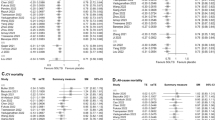Abstract
Background
Omecamtiv mecarbil (OM) is a direct myosin activator that augments left ventricular systolic function. This review compares OM to placebo by evaluating its effect on clinical outcomes and adverse events in patients with heart failure with reduced left ventricular ejection fraction.
Methods and results
A literature search of multiple databases for randomized controlled trials (RCTs) investigating OM versus placebo was undertaken. Six RCTs comprising 9596 patients were included. Use of OM was associated with a reduced risk of stroke (RR: 0.69; 95% CI 0.52–0.92). There was no significant mean difference (MD) change in the KCCQ total symptom score (MD: 1.82, 95% CI − 1.33 to 4.97), all-cause death (RR: 1.00; 95% CI 0.93–1.07), hospital readmissions (RR: 0.96; 95% CI 0.90–1.03), myocardial infarction (RR: 1.05; 95% CI 0.83–1.33), cardiovascular death (RR: 1.01; 95% CI 0.92–1.10), heart failure (HF) events (RR: 0.95; 95% CI 0.89–1.02), or a composite of cardiovascular death or HF events (RR: 0.97; 95% CI 0.93–1.02). In addition, OM was associated with an increased risk of dizziness (RR: 1.25; 95% CI 1.04–1.50) and hypotension (RR: 1.17; 95% CI 1.01–1.36). Other adverse events including ventricular tachyarrhythmias, (RR: 0.95; 95% CI 0.82–1.11), supraventricular tachyarrhythmias and atrial fibrillation/flutter (RR: 0.73; 95% CI 0.46–1.18), dyspnea (RR: 1.00; 95% CI 0.86–1.18), and acute renal injury (RR: 0.88; 95% CI 0.60–1.27) were not significant.
Conclusion
OM is generally well tolerated. We identified a reduced risk of stroke with use of OM. However, there was no improvement in other clinical outcomes or quality of life.
Study protocol was registered in PROSPERO international prospective register of systematic reviews (CRD42022348423).
Graphical abstract









Similar content being viewed by others
Data availability
All data used in our meta-analyses are publicly available and de-identified within each individual trial.
References
Murphy SP, Ibrahim NE, Januzzi JL Jr (2020) Heart failure with reduced ejection fraction: a review. JAMA 324(5):488–504
Malik FI et al (2011) Cardiac myosin activation: a potential therapeutic approach for systolic heart failure. Science 331(6023):1439–1443
Higgins JP et al (2011) The Cochrane Collaboration’s tool for assessing risk of bias in randomised trials. BMJ 343:d5928
McGuinness LA, Higgins JPT (2021) Risk-of-bias VISualization (robvis): An R package and Shiny web app for visualizing risk-of-bias assessments. Res Synth Methods 12(1):55–61
Cleland JG et al (2011) The effects of the cardiac myosin activator, omecamtiv mecarbil, on cardiac function in systolic heart failure: a double-blind, placebo-controlled, crossover, dose-ranging phase 2 trial. Lancet 378(9792):676–683
Greenberg BH et al (2015) Safety and tolerability of omecamtiv mecarbil during exercise in patients with ischemic cardiomyopathy and angina. JACC Heart Fail 3(1):22–29
Lewis GD et al (2022) Effect of omecamtiv mecarbil on exercise capacity in chronic heart failure with reduced ejection fraction: the METEORIC-HF randomized clinical trial. JAMA 328(3):259–269
Teerlink JR et al (2021) Cardiac myosin activation with omecamtiv mecarbil in systolic heart failure. N Engl J Med 384(2):105–116
Teerlink JR et al (2016) Chronic oral study of myosin activation to increase contractility in heart failure (COSMIC-HF): a phase 2, pharmacokinetic, randomised, placebo-controlled trial. Lancet 388(10062):2895–2903
Teerlink JR et al (2016) Acute treatment with omecamtiv mecarbil to increase contractility in acute heart failure: the ATOMIC-AHF study. J Am Coll Cardiol 67(12):1444–1455
Alqatati F et al (2022) Safety and efficacy of omecamtiv mecarbil for heart failure: a systematic review and meta-analysis. Indian Heart J 74(3):155–162
Voors AA et al (2020) Effects of danicamtiv, a novel cardiac myosin activator, in heart failure with reduced ejection fraction: experimental data and clinical results from a phase 2a trial. Eur J Heart Fail 22(9):1649–1658
Lewis GD et al (2022) Developments in exercise capacity assessment in heart failure clinical trials and the rationale for the design of METEORIC-HF. Circ Heart Fail 15(5):e008970
Solomon SD et al (2022) Influence of atrial fibrillation on efficacy and safety of omecamtiv mecarbil in heart failure: the GALACTIC-HF trial. Eur Heart J 43(23):2212–2220
Funding
This research did not receive any specific grant from funding agencies in the public, commercial, or not-for-profit sectors.
Author information
Authors and Affiliations
Corresponding author
Ethics declarations
Conflict of interest
Authors have no conflict of interest.
Rights and permissions
Springer Nature or its licensor (e.g. a society or other partner) holds exclusive rights to this article under a publishing agreement with the author(s) or other rightsholder(s); author self-archiving of the accepted manuscript version of this article is solely governed by the terms of such publishing agreement and applicable law.
About this article
Cite this article
Ibrahim, R., Olagunju, A., Terrani, K. et al. KCCQ total symptom score, clinical outcome measures, and adverse events associated with omecamtiv mecarbil for heart failure with reduced ejection fraction: a systematic review and meta-analysis of randomized controlled trials. Clin Res Cardiol 112, 1067–1076 (2023). https://doi.org/10.1007/s00392-023-02172-w
Received:
Accepted:
Published:
Issue Date:
DOI: https://doi.org/10.1007/s00392-023-02172-w




